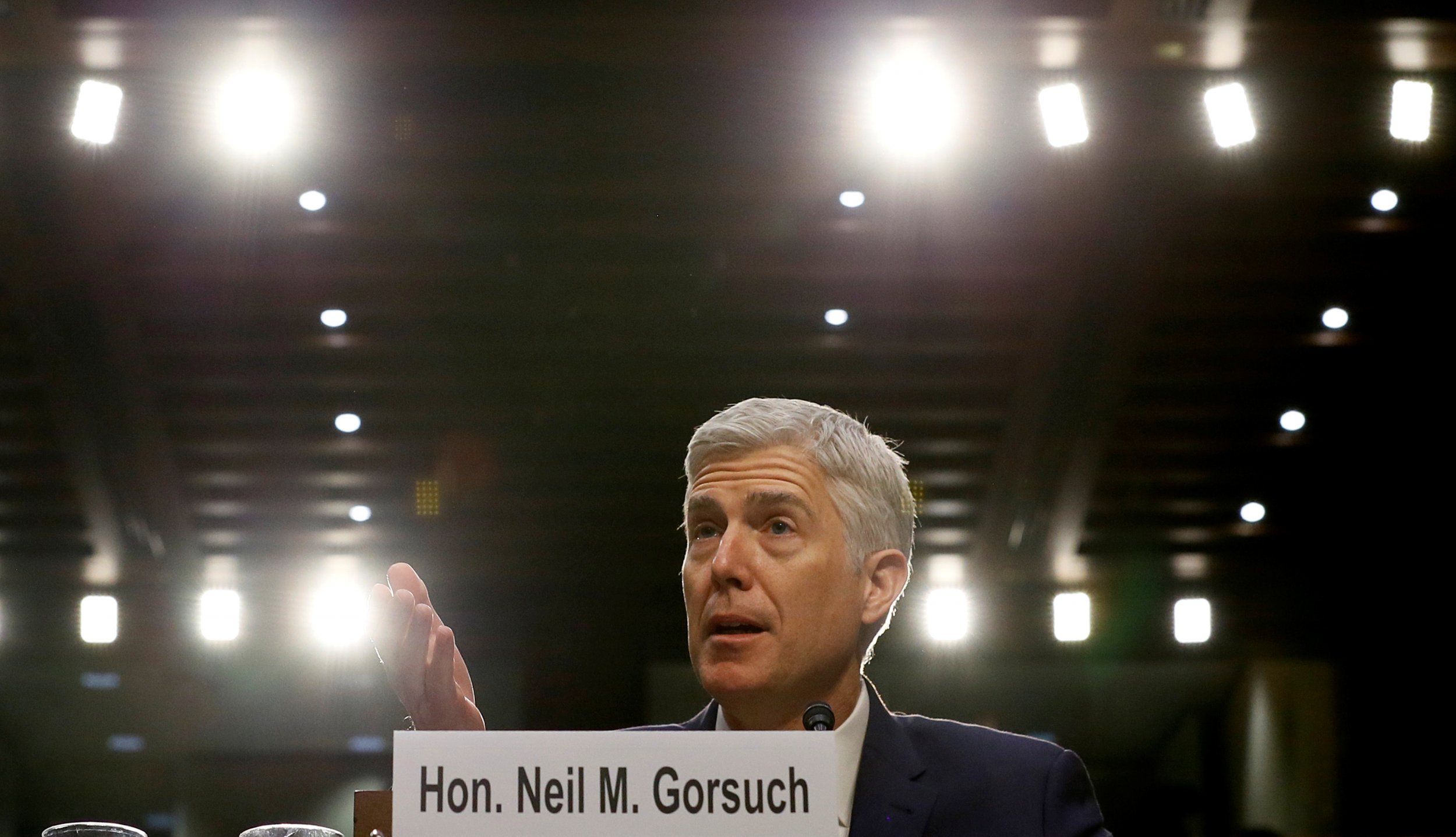
Last week, Neil Gorsuch did about as well as a Supreme Court nominee could before the Senate Judiciary Committee. He got some thorough grilling from Democratic members, including Rhode Island's Sheldon Whitehouse and Minnesota's Al Franken, who questioned decisions as a federal appeals court judge that seemed to be overwhelmingly on the side of corporate versus labor interests. But for the most part Gorsuch mastered a technique that's been used by pretty much all Supreme Court nominees since Robert Bork's nomination went down to defeat in 1987. Bork had a long, colorful, acclaimed paper trail, and he wasn't shy about defending it. Democrats seized on it and managed to defeat his nomination, winning over several GOP members.
Since then nominees have been much more circumspect, saying that they didn't really have opinions about cases like Roe v. Wade—which is crazy since pretty much everyone has an opinion about the landmark 1973 decision that invalidated state bans on abortion. The key for every nominee is to be hyper polite, promise to be fair and get through the thing.
RELATED: With Gorsuch, Trump leans right but stays mainstream
Gorsuch feigned outrage at the idea that he would let any political leanings taint his opinions. And that's surely true in a literal sense. Even though Gorsuch grew up in a prominent Republican family—his mom was the EPA Administrator under Ronald Reagan—no one thinks he's going to write opinions with the hope of pleasing Donald Trump. But he does have a worldview, which is why so many conservative interest groups fought like hell to keep Barack Obama's nominee, Merrick Garland, from even getting a hearing. If you're watching television in Washington D.C. and seeing all of the pro Gorsuch ads come on, you know that conservatives don't believe he's entirely apolitical—even if the 49-year-old swears he is.
It would be nice if we could dispense with the fiction that the men and women who are nominated to the high court have no political leanings. Chief Justice John Roberts said he'd be like an umpire who just called balls and strikes and had no interest in legislating from the bench. But Roberts authored two landmark opinions that can only be considered legislating from the bench. In his opinion on the Voting Rights Act, the chief, in another one of those 5-4 decisions, threw out 50 years of consensus about how the act's so-called preclearance provision should be administered. Congress had reauthorized the act almost unanimously in 2005, and President George W. Bush signed their handiwork, including its stipulation that certain areas of the country had to get Justice Department or judicial approval before they could change any voting procedures. Poof. Gone.
Roberts also was a super activist when it came to the Citizens United decision that unsettled a century of campaign finance and corporate donation law. It's not that Roberts is monolithically conservative. His surprise vote upheld the individual mandate that's at the heart of Obamacare. But he does have a worldview, a political view, that informs how he sees the law. That's surely true of Elena Kagan, a veteran of the Clinton White House, or Clarence Thomas, who worked in the Reagan and first Bush administrations. Supreme Court nominees are political actors with political histories. It doesn't mean that they are party hacks, mere apparatchiks. But neither are they heads-in-the-clouds scholars who have no political history.
At other times in our history we've been more honest about this. It used to be that presidents regularly appointed politicians to the court like Earl Warren, the governor of California, appointed by Dwight Eisenhower, or Hugo Black, the Alabama senator tapped by Franklin Roosevelt. Today no member of the court had run for elective office. The last one who had was Sandra Day O'Connor, who was a state senator in Arizona. When presidents appointed actual elected officials it was a reminder that the court is a kind of political body. Just because it's now filled mostly by lifelong jurists doesn't make it any less so. Gorsuch may or may not survive a threatened Democratic filibuster. But if the 49-year-old does make it to the court he's going to prove to have political sensibilities. Pretending otherwise will seem just as silly as it does for his other colleagues in black robes.
Uncommon Knowledge
Newsweek is committed to challenging conventional wisdom and finding connections in the search for common ground.
Newsweek is committed to challenging conventional wisdom and finding connections in the search for common ground.
About the writer
Matthew Cooper has worked for some of America's most prestigious magazines including Time, The New Republic, National Journal, U.S. News ... Read more
To read how Newsweek uses AI as a newsroom tool, Click here.








